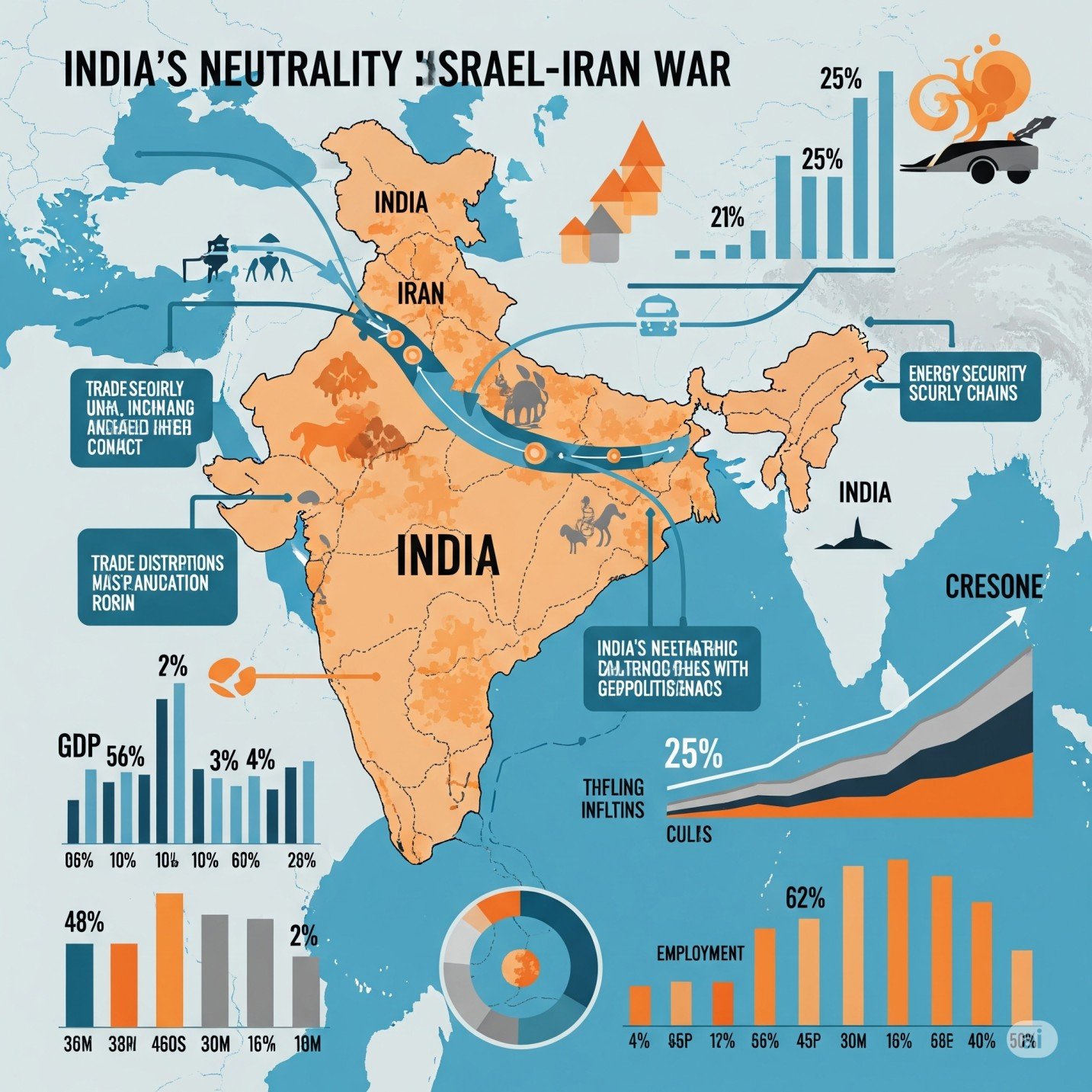
Israel-Iran Conflict: Why India Is Watching Closely
As tensions rise between Israel and Iran, India finds itself in a sensitive position. While the military conflict may be happening thousands of kilometers away, its impact could be felt deeply in India — from oil prices and shipping delays to trade risks and diplomatic balancing acts.
Rising Oil Prices: A Blow to India’s Economy
India imports nearly 89% of its crude oil, making the global energy market critically important. If military actions affect the Strait of Hormuz — a key route for global oil shipments — it could send oil prices soaring.
Analysts suggest that a $10-per-barrel increase in crude prices could:
- Add up to ₹1 lakh crore to India’s annual oil bill
- Increase the current account deficit by about 0.3% of GDP
- Push up fuel, grocery, and transport costs for everyday consumers
- Squeeze profit margins for businesses in sectors like aviation, auto, logistics, FMCG, and chemicals
- Put pressure on the Rupee, making imports costlier and possibly triggering inflation
India has worked to diversify its energy sources, including imports from Russia, Brazil, Canada, and the U.S. However, a prolonged Middle East crisis could still pose a significant threat to energy security.
Disrupted Trade Routes: Longer Shipping Times, Higher Costs
The conflict is also disrupting global shipping, especially in the Red Sea and Suez Canal, where Iran-backed Houthi attacks have escalated. Many Indian exporters are being forced to reroute shipments around the Cape of Good Hope.
This alternative route adds up to 6,000 nautical miles and 2–3 weeks to shipping times, raising freight costs by 15–20%. Sectors like textiles, engineering goods, and garments are already seeing tighter margins due to increased transit times and expenses.
Additionally, India’s bilateral trade with both Israel and Iran — where India traditionally maintains a trade surplus — could slow down if tensions escalate further.
Walking the Diplomatic Tightrope
India enjoys strong relations with both Israel and Iran. Israel is a key defense partner, providing advanced technology and military support. Iran offers strategic connectivity through the Chabahar Port, which is vital for India’s trade links with Central Asia and Afghanistan.
In this complex scenario, India is carefully maintaining a neutral position. It has urged both countries to exercise restraint and resolve differences through diplomacy. Recently, India even distanced itself from the Shanghai Cooperation Organisation’s (SCO) statement criticizing Israel — a move that signals its independent foreign policy stance.
Broader Impacts: From Gulf Remittances to Market Volatility
Millions of Indians live and work in Gulf countries, contributing significantly to India’s remittances. Any regional instability could impact their safety, employment, and income — ultimately affecting families back home and foreign exchange reserves.
At the same time, financial experts warn that the ongoing conflict could shake investor confidence. If foreign institutional investors (FIIs) pull out funds, it might lead to stock market volatility in India.
India’s Strategy Going Forward
To minimize risk, India is expected to take several steps in the weeks ahead:
- Accelerate diversification of oil sources away from the Middle East
- Strengthen naval operations to safeguard shipping routes
- Maintain open diplomatic channels with both Israel and Iran
- Monitor economic indicators closely and remain flexible in its energy and foreign policies
Final Thoughts: A Test of Resilience
India has successfully navigated past global crises — from COVID-19 to the Russia-Ukraine war — with a mix of strategy, diplomacy, and economic discipline. The Israel-Iran conflict presents a fresh challenge, but India’s focus remains on maintaining stability, safeguarding national interests, and continuing its growth momentum in a turbulent world.
Stay tuned for further updates on this developing story.
- Digital India: Identify Your Land Survey Number Instantly Using Your Smartphone
- AI in Farming: How Indian Farmers Are Transforming Agriculture
- Best Winter Crops for Export From India
- Dhaincha Farming Guide: Save 50% on Urea & Improve Soil Health
- Fertilizer Booking App Guide: How to Book Urea Online










